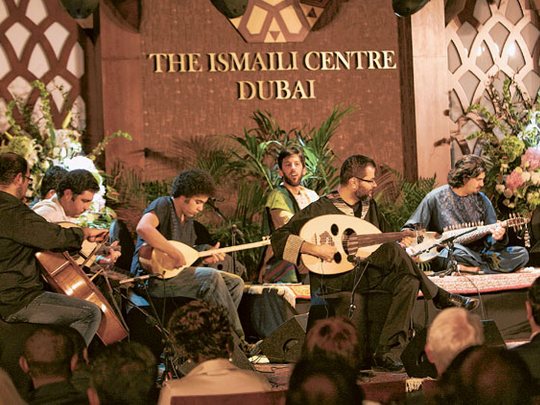
Dubai: There was no room for chatter at the Remix 2011 concert last week. All attention was on the 12-man band on stage at the Ismaili Centre in Dubai.
The talented musicians captured the attention of hall as they played their instruments. Lured into submission by one composition after another, the audience surrendered in blissful silence.
In an attempt to immortalise the musical legacies of the Middle East and Central Asia the Aga Khan Music Initiative organises such performances and educational programmes among young artists across several countries.
"Not only the archaic instruments but the Ismaili Centre with its scenic structure in the heart of Dubai inspired by the Fatimid era transported us back to an ancient time," a member of the audience said.
"Only to be brought back to the present by the torrents of contemporary tunes flowing from the stage," she added.
The power of each piece from the oud to the Kemanche (similar to the violin), Rubab (lute), and Tabla (local drums) cast a spell in the room.
"This performance at the least revealed the treasure of such a heritage and the passion a dedicated few have for preserving what is left of a world of magic," said Sam Kotkat, who attended the concert.
Charbel Rouhana, leader of the Remix 2011 told Gulf News that he thrives on preserving the traditional instruments of his band.
"I don't want to arrive in a certain period where these instruments won't exist anymore," Charbel explained.
The talented and surprisingly tall Lebanese oud player, singer and composer has a modest elegance and calm manner. Playing is his second nature which becomes clear as he strummed the oud.
Born with the inspiration and passion to be a musician, at age five he began singing to a household of 11 children, among whom he was the tenth. His musical entourage along with his cousin, the famous oud virtuoso Marcel Khalifa, are what inspired him to play the oud.
"I was influenced by him; at the time he was my idol," Charbel said.
Charbel's inspiration
Charbel describes himself as a romantic and his inspiration seems to come from the same source — love.
"Most of the time my inspiration comes from women," he says as he remembers creating one of his songs while putting his daughter, Haifa, to sleep by playing the oud.
He tells of his two children and the third, the oud, sitting next to him under his watchful eye. The sun sets on the homely room at the Ismaili Centre and Charbel, relaxing in an over-sized futon, reflects on his mission in this tour.
Humbly guiding the group, he looks forward to the exchange of ideas between the 12 musicians.
"These meetings don't just affect the duration of the meeting, they could go with me, with every musician through his life, through his music. So when I have to write music I cannot put away this experience," he said.
He has won several awards and developed a new method for playing the oud. Charbel has travelled and performed for many audiences and he said his goal is to bond with the audience.
As the band played its last tune, the audience crooned back its goodbyes, looking forward to the next time the band returns to perform another time.
Aga Khan initiative preserves musical heritage
The Aga Khan Music Initiative (AKMI) was launched by the Aga Khan in 2000 to preserve and develop the musical heritage of the Middle East and Central Asia. AKMI organises performances and educational programmes in Egypt, Syria, Kazakhstan, Tajikistan, Afghanistan, Pakistan, India, and Mali.
The initiative supports collaborations among musicians to promote awareness of the millennium-old musical culture of these regions. The programmes and performances are part of efforts to reconstruct traditional heritage into a new model suitable to the present-day.












